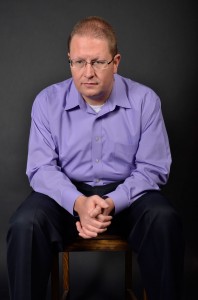By Karen Gavis/managing editor

Photos by David Reid/The Collegian
The academic advisor had worked diligently for years toward his goal of becoming a TCC registrar. He was making more money than ever.
However, Adam Baugh was miserable. Pieces of his life began to fall like dominoes.
His personal journey led him down a winding path of bad days, doctor visits, a hospital stay and thoughts of suicide. He survived the journey and learned what can cause depression and more about himself as well.
“I share my story today with the hope of encouraging and helping someone else that may be facing this situation or know someone who is,” he said.
In March 2011, Baugh had spent 18 months as a TR Campus registrar but realized the position was not a good match for him. He made a voluntary decision to take a demotion and cut in pay to return to a job he loved. However, the decision began a seemingly downward spiral.
“As excited as I was to return to advising, I did feel a loss due to leaving my administrative position because I had worked toward this goal at TCC since I was 18 years old,” he said. “I also felt the loss of a higher income for my family.”

Photos by David Reid/The Collegian
Eventually, Baugh’s identity began to fade, he said. He was unsure what he was supposed to be in life and did not feel well.
After visiting a physician for elevated blood pressure, Baugh was prescribed Xanax to help him sleep more soundly. A few months later, he began to experience side effects including anxiety, panic attacks, hallucinations, insomnia, moodiness, nightmares and nausea, he said. He missed weeks of work, had difficulty functioning in everyday life and ultimately became suicidal.
“I’ve never been suicidal in my life,” he said. “Two months after taking Xanax, I was suicidal.”
Baugh returned to his doctor who told him to quit taking Xanax immediately and sent him home with a sack full of anti-depressant samples, he said.
His wife, Lisa, said her guard was up at this point, and she realized she needed to be an advocate of her husband’s health.
“I started swimming in the sea of Internet knowledge regarding these drugs, their side effects, their use, the clinical trials, studies, deaths and ongoing court cases,” she said. “Needless to say, I was alarmed at my findings.”
The couple decided Baugh would not take antidepressants because of his recent experience with Xanax.
Then, after 18 years at TCC, Baugh returned to work one Monday and offered to resign.
Although he had time to rest, read and travel with his family, they were living on his teacher retirement account. By August 2011, that was depleted, he said.
Baugh learned of an academic advisor opening on NE and was rehired, he said. Everything went well for about six months, but that soon changed.
NE counseling director Condoa Parrent said she knew something was wrong because Baugh would call in sick.
“Adam tried very, very hard to maintain the level of professionalism that he has,” she said. “There comes a time that you can’t fight it alone. It took him a while to recognize that.”
Baugh said he felt as if a dark cloud had returned to his life. A friend recommended he
seek professional help. At first, he was reluctant because of the stigma it carries.
“You don’t want people to think you are crazy,” he said. “When you get to the point that you have no hope, you’ve got to do something.”
Lisa Baugh phoned a psychiatrist only to be told an appointment could not be secured
for another month. Lacking options, Baugh said he admitted himself to Springwood Hospital, where he was diagnosed with clinical depression and given 10 milligrams of Celexa, an antidepressant. He followed his recommended treatment plan of follow-up counseling visits and an increased dosage of Celexa.
When his depression returned and he began experiencing migraines and stomach pain, he was told to further increase the dosage and return to the hospital. Baugh said he realized he needed to become more actively involved in his own treatment.
“Up to this point, I had blindly trusted everyone involved thinking they were the experts and that they knew more about depression than I did,” he said. “Never once did I consider that I had not been given one physiological test this entire time to determine if there was anything physically causing the depression.”
About that time, a colleague brought Baugh Just Because You’re Depressed Doesn’t Mean You Have Depression, a book by Dr. Mary Ann Block. Baugh said his initial reaction was not to read it.
Curiosity prevailed, and two days later he had finished the book. In it, Block advocated getting physiological testing done to determine the root cause of depression, Baugh said.
“I was excited about the possibilities, but as I looked up the author, I thought, ‘Let’s see where is this doctor located – in New York, Los Angeles?’” he said.
To his surprise, she was in Hurst just a few moments from campus. He made an appointment, and Block’s words offered hope, Baugh said.
“She said, ‘Mr. Baugh, I don’t think you have depression. You may have a B-12 or magnesium deficiency, or you may have a thyroid issue, but I am not going to say you have depression until we rule out everything else,’” he said.
Baugh underwent extensive testing and began taking supplements, he said. He discovered he was B-12 and magnesium deficient and also needed to change his eating and exercise habits.
“I think the major change that gave me back my life was changing doctors and finding a doctor who believes in working hard to investigate the cause of each symptom instead of just saying, ‘Take another pill,’” he said.
Baugh said his lowest point came one day when he sat in another room listening to his family talk about how to help him. He remembers thinking how ironic it would be if he had a gun and just ended it all then. A person’s mind loves to say no one cares, Baugh said. His mind told him that his family would be better off without him.
“Just knowing those things aren’t true helps,” he said.
Baugh said it important not to become isolated because it helps just to feel the presence of family and friends, even if the troubled person doesn’t talk.
Without the constant love and encouragement of his wife and her ever-present smile, Baugh said he would not have survived. It was her unwavering love combined with prayers and support of family and friends and his faith in God that sustained him.
According to the Center for Disease Control, one of every 10 people in the U.S. reports depression, Lisa Baugh said. But many cases go unreported, and those numbers do not include children.
“If you struggle with depression, get help now,” she said. “Find a person you can trust and tell them. We are not meant to face such challenges alone.”
Today, Baugh welcomes visitors to his office with a beaming smile. He is happy with who he is and is “no longer climbing the ladder,” he said.
“We try to prove we are the best because we feel the worst about ourselves,” he said. “In the past, everything had to be perfect. That is a good way to put yourself in the hospital.”




























